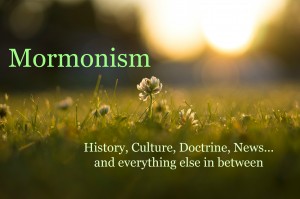 In an interfaith online group I belong to, there are regular discussions about the issue of faith vs. works. Frequently when I write about Mormon rules (commandments), someone will say, “Oh, I don’t have to keep the commandments because the atonement covered it.”
In an interfaith online group I belong to, there are regular discussions about the issue of faith vs. works. Frequently when I write about Mormon rules (commandments), someone will say, “Oh, I don’t have to keep the commandments because the atonement covered it.”
It seems that some people believe that all those things Jesus was teaching when He was on the earth went away the moment He died and now we are free to do whatever we want. That doesn’t really make sense, does it? Nowhere in the Bible did Jesus say, “Keep the commandments until I die; then do whatever you like.” The atonement allowed us to be forgiven of our sins; it was not a license to sin freely and willingly without cost.
In fact, I find the people who say it don’t really seem to believe it. They agree that you can’t accept Jesus as your Savior and then go rob banks, still calling yourself a faithful Christian who is guaranteed a place in Heaven. They are more comfortable when the atonement keeps them from something like tithing or even church attendance. However, everyone agrees a certain level of morality is necessary. Clearly, our actions do matter. They are our faith in action.
 I suspect the longing for Heaven is so great they just want to feel sure they will get in, and so they have accepted a teaching that is losing favor even among faiths that have long accepted it. Many no longer believe a wise God would let you get into Heaven with no more than a single statement of faith. They are beginning to accept what Jesus taught on the subject:
I suspect the longing for Heaven is so great they just want to feel sure they will get in, and so they have accepted a teaching that is losing favor even among faiths that have long accepted it. Many no longer believe a wise God would let you get into Heaven with no more than a single statement of faith. They are beginning to accept what Jesus taught on the subject:
If ye love me, keep my commandments (John 14:15).
Jesus answered and said unto him, If a man love me, he will keep my words: and my Father will love him, and we will come unto him, and make our abode with him.
He that loveth me not keepeth not my sayings: and the word which ye hear is not mine, but the Father’s which sent me (verses 23-24)
.Not every one that saith unto me, Lord, Lord, shall enter into the kingdom of heaven; but he that doeth the will of my Father which is in heaven (Matthew 7:21).
Jesus talked a lot about the importance of obeying the commandments and tied them directly to being able to return home to God. He loves us too much to let us live random, meaningless lives, doing things that will harm us and that will turn us into the kinds of people who are not worthy of God’s presence. The atonement is not a convenient way to get out of having self-discipline and morality. It is a very sacred gift and it comes with responsibilities.
Here’s how Mormons look at commandments:
If Jesus Hadn’t Atoned for Our Sins, Could We Have Earned Our Way to Heaven?
 No, Mormons do not believe it is possible for anyone to get into God’s presence without the atonement. We all experience the consequences of the Fall of Adam and none of us are able to live perfectly. Jesus Christ was the only One able to meet all the requirements to atone for our sins and He did so voluntarily, which was also a requirement.
No, Mormons do not believe it is possible for anyone to get into God’s presence without the atonement. We all experience the consequences of the Fall of Adam and none of us are able to live perfectly. Jesus Christ was the only One able to meet all the requirements to atone for our sins and He did so voluntarily, which was also a requirement.
Sheri Dew, a former international women’s leader, said:
The Savior isn’t our last chance; He is our only chance. Our only chance to overcome self-doubt and catch a vision of who we may become. Our only chance to repent and have our sins washed clean. Our only chance to purify our hearts, subdue our weaknesses, and avoid the adversary. Our only chance to obtain redemption and exaltation. Our only chance to find peace and happiness in this life and eternal life in the world to come (Sheri L. Dew, Our Only Chance, General Conference of The Church of Jesus Christ of Latter-day Saints, April 1999).
Why did God make so many rules?
 The rules we have today are actually fewer than those the ancient Israelites had to follow. However, God doesn’t make random rules just for entertainment. Every rule has a purpose. It is often easier to keep the commandments if we take some time to think about the possible benefits of the commandments we are struggling with. Then we can take what we learn to God in prayer, where we can receive a confirmation of the commandment. We find it easier to keep the commandments when we remember that this life is not all there is.
The rules we have today are actually fewer than those the ancient Israelites had to follow. However, God doesn’t make random rules just for entertainment. Every rule has a purpose. It is often easier to keep the commandments if we take some time to think about the possible benefits of the commandments we are struggling with. Then we can take what we learn to God in prayer, where we can receive a confirmation of the commandment. We find it easier to keep the commandments when we remember that this life is not all there is.
“One of Satan’s clever tactics is to tempt us to concentrate on the present and ignore the future.”– Elder M. Russell Ballard, Purity Precedes Power, General Conference of The Church of Jesus Christ of Latter-day Saints, November, 1990).
Sometimes the benefits are obvious. Paying tithing, a rule many non-Mormons criticize tithe payers for keeping, provides the funds to carry out God’s work. The atonement didn’t make it free to run God’s church. The money is needed, even in a church like ours that is a lay church. However, there are also personal benefits to paying tithing. We are reminded that all we have comes from God, and so, returning a little of it is not hard. When I teach small children at church about tithing, I give them each ten pennies. I ask them to share the money with God and ask them if they think it would be fair if God got one penny and they got all the rest. They always think that is a very good arrangement, since they get to keep the most money. Some quietly slip some extra pennies into the tithing envelope because they think God deserves more. Paying tithing helps us learn to be unselfish with our money, to live a responsible life within our budgets so we can afford tithing, and to put God before worldly needs.
Ezra Taft Benson said, “When obedience ceases to be an irritant and becomes our quest, in that moment God will endow us with power.” While keeping the commandments can be challenging and can force us to put aside our most cherished sins, to be true followers of Christ, we not only have to keep them we have to love keeping them. This helps us to demonstrate to ourselves and to God that we are true disciples of Christ. Our obedience to the commandments does not save us. We can obey perfectly all day, but if our obedience is not ultimately based on love for the Savior, it does not have an eternal impact.
If it’s hard to keep the commandments, or to keep them for the right reasons, what do I do?
When children are small, their parents make rules for them to follow. Often, at first, they keep those rules only to stay out of trouble or because they love their parents. Over time, as they see how those rules help them, they internalize the rules and make them their own.
This is often the process we follow as well. When I first considered becoming a Mormon, I was pretty overwhelmed by the rules. I began keeping a few at a time—the ones the missionaries or my youth leaders taught me—and keeping track of what happened as I did. In time, I saw the blessings that came from keeping them, so it became easier.
 As time went on, after I was a Mormon, I learned more about God and Jesus Christ and began to develop a very personal relationship with them. As my love for them grew, I found myself keeping the commandments not just for the blessings, but because I wanted to give back to God and Jesus Christ, who had given so much to me. Love was now my greatest motivator.
As time went on, after I was a Mormon, I learned more about God and Jesus Christ and began to develop a very personal relationship with them. As my love for them grew, I found myself keeping the commandments not just for the blessings, but because I wanted to give back to God and Jesus Christ, who had given so much to me. Love was now my greatest motivator.
Learning to focus on eternity helped. When I was focused just on this life, tithing was hard. Many of the things that were hard were hard only because I was not thinking eternally. As my ability to think eternally improved, my ability to keep the commandments improved.
Of course, I made many mistakes, but God planned for that. Repentance was a critical part of my process of learning to obey the gospel commandments. Repentance is not easy, but it, also, is a gift of love, both to ourselves, and to God.
Learn more about repentance
Mormons may seem to have a lot of rules, but they are commandments—God’s rules—and they are a gift of love to His children.
About Terrie Lynn Bittner
The late Terrie Lynn Bittner—beloved wife, mother, grandmother, and friend—was the author of two homeschooling books and numerous articles, including several that appeared in Latter-day Saint magazines. She became a member of the Church at the age of 17 and began sharing her faith online in 1992.








Thank you for this. So few understand the relationship between the commandments and the atonement.
I have found this post absolutely enlightening and inspiring. This approach to keeping the commandments as a means of showing gratitude rather than a means of getting something from God makes so much sense!
Thank you